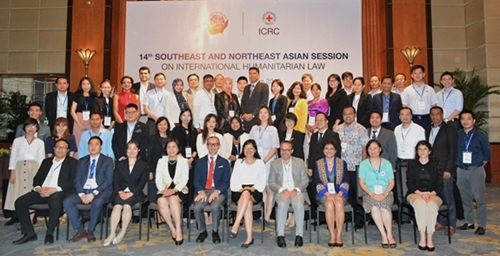June 25, 2019 | 20:36 (GMT+7)
Vietnam respects and promotes enforcement of int’l humanitarian law
PANO - The government and people of Vietnam always respect and promote the enforcement of the International Humanitarian Law, especially Geneva Conventions in 1949, in both wartime and peacetime, said Le Thi Tuyet Mai, Head of the Department of International Law and Treaties under the Vietnamese Ministry of Foreign Affairs, at a conference on June 24 in Hanoi.
The five-day conference, co-organized by the International Committee on Red Cross (ICRC) and the Diplomatic Academy of Vietnam, bringing together nearly 50 delegates from 16 countries looked into the enforcement of the International Humanitarian Law in Northeast and Southeast Asia.
Ms. Mai said that Vietnam joined the 1949 Geneva Conventions on International Humanitarian Law in 1957. The conventions comprise four treaties on protection and care for wounded and sick soldiers on land during wartime; wounded, sick, and shipwrecked military personnel at sea during wartime; protection of civilians during wartime and treatment to prisoners of war.
    |
 |
|
Delegates in a joint photo |
Apart from the above-mentioned conventions, Vietnam also joined other conventions related to International Humanitarian Law, including the 1948 UN Convention on the Prevention and Punishment of the Crime of Genocide, the 1972 Biological Weapons Convention, the 1993 Chemical Weapons Convention, and the 2017 Treaty on the Prohibition of Nuclear Weapons.
Emphasizing the 1949 Geneva Conventions as the foundation of the present International Humanitarian Law, the Vietnamese official said that interpreting and realizing these conventions are really big challenges, especially in the context that scientific and technological advances have changed the form of waging a war.
Meanwhile, Gianni Volpin, Head of the ICRC in Vietnam, held that the meeting aimed to encourage countries in the region to promote their engagement in enforcing, developing and interpreting the International Humanitarian Law in a correct manner.
He added that the meeting’s agenda was designed to promote professional knowledge of law and policies for humanitarian activities and create conditions to boost the dissemination and teaching of International Humanitarian Law.
He expressed his belief that activities held during the meeting will create an effective premise for representatives from government bodies and experts to contribute to the exchange of information and experience in the region on current pressing issues of humanitarian law.
Translated by Song Anh